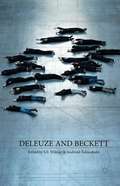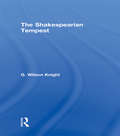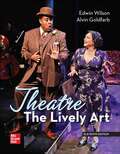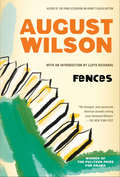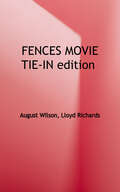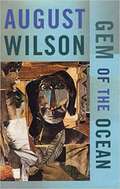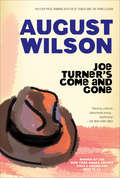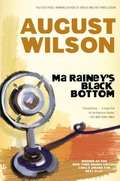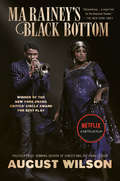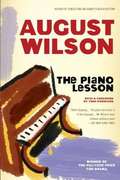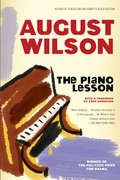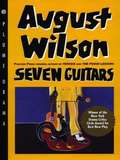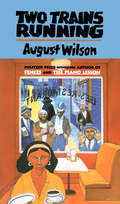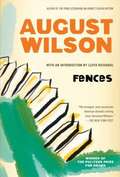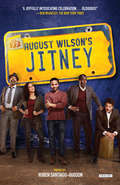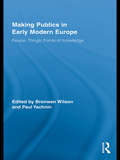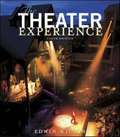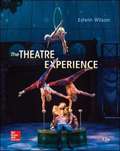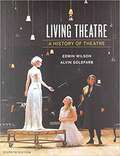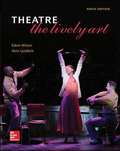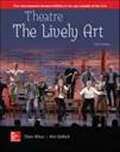- Table View
- List View
Deleuze and Beckett
by S. E. Wilmer Audronė ŽukauskaitėDeleuze and Beckett is a collection of essays illuminating similarities between the philosophies and practices of Deleuze and Beckett. The contributors include some of the leading Beckett and Deleuze specialists in the world, and their essays address different ideas and concepts of Deleuzian philosophy as well as a wide range of Beckett's oeuvre, including his novels, short stories, stage and television plays, and film work. The book considers Deleuze's interpretation of Beckett's work anddemonstrates that Deleuzian concepts and ideas can be usefully applied to Beckett's texts in order provide a greater understanding of Beckett's characters and their journeys. Deleuze's philosophy helps us to recognize that what has been seen as the private territory of despair, loneliness, and emptiness in Beckett's work masks a world of flow and fluctuation that expresses multiple and heterogeneous possibilities.
The Mask Handbook: A Practical Guide
by Toby WilsherThis book, from Europe’s leading Mask director and co-founder of the Trestle Theatre Company, provides a fascinating demystification of the process of using masks. Full of simple explanations, and collating over twenty-five years’ experience of writing for, directing and acting in masks, The Mask Handbook examines how masks have the ability to play the fundamental game of theatre – the suspension of disbelief. The Handbook includes: an introduction to the origin of masks advice on preparing, making and using masks tips on writing, devising and directing maskwork lots of fun and effective practical exercises. This accessible and inspiring handbook will empower teachers, directors and actors to fully explore the world of the mask.
Shakespearian Tempest - V 2
by G. Wilsin KnightFirst published in 2002. Routledge is an imprint of Taylor & Francis, an informa company.
Theatre: The Lively Art
by WilsonSeveral qualities set Theatre: The Lively Art apart from other introductory texts. A particularly important element is our emphasis on the audience. All students reading the book are potential theatregoers, not just during their college years but throughout their lives. We have therefore attempted to make This new edition is an ideal one-volume text to prepare students as future audience members. It will give them a grasp of how theatre functions, of how it should be viewed and judged, and of the tradition behind any performance they may attend. Lively Art allows instructors to focus on both the elements of the theatre and the history of the theatre. It also focuses on today's diverse and global theatre. In addition to serving as an ideal text for nonmajors, Theatre: The Lively Art will prepare students who wish to continue studies in theatre, as majors, minors, or students from other disciplines who take advanced courses.
Fences: A Play (Sparknotes Literature Guide Ser.)
by August WilsonFrom legendary playwright August Wilson comes the powerful, stunning dramatic bestseller that won him critical acclaim, including the Tony Award for Best Play and the Pulitzer Prize.Troy Maxson is a strong man, a hard man. He has had to be to survive. Troy Maxson has gone through life in an America where to be proud and black is to face pressures that could crush a man, body and soul. But the 1950s are yielding to the new spirit of liberation in the 1960s, a spirit that is changing the world Troy Maxson has learned to deal with the only way he can, a spirit that is making him a stranger, angry and afraid, in a world he never knew and to a wife and son he understands less and less. This is a modern classic, a book that deals with the impossibly difficult themes of race in America, set during the Civil Rights Movement of the 1950s and 60s. Now an Academy Award-winning film directed by and starring Denzel Washington, along with Academy Award and Golden Globe winner Viola Davis.
Fences (movie Tie-in)
by August WilsonFrom legendary playwright August Wilson comes the powerful, stunning dramatic bestseller that won him critical acclaim, including the Tony Award for Best Play and the Pulitzer Prize. Troy Maxson is a strong man, a hard man. He has had to be to survive. Troy Maxson has gone through life in an America where to be proud and black is to face pressures that could crush a man, body and soul. But the 1950s are yielding to the new spirit of liberation in the 1960s, a spirit that is changing the world Troy Maxson has learned to deal with the only way he can, a spirit that is making him a stranger, angry and afraid, in a world he never knew and to a wife and son he understands less and less. This is a modern classic, a book that deals with the impossibly difficult themes of race in America, set during the Civil Rights Movement of the 1950s and 60s. Now an Academy Award-winning film directed by and starring Denzel Washington, along with Academy Award and Golden Globe winner Viola Davis.
Gem Of The Ocean
by August Wilson“No one except perhaps Eugene O’Neill and Tennessee Williams has aimed so high and achieved so much in the American theater.”—John Lahr, The New Yorker “A swelling battle hymn of transporting beauty. Theatergoers who have followed August Wilson’s career will find in Gem a touchstone for everything else he has written.”—Ben Brantley, The New York Times “Wilson’s juiciest material. The play holds the stage and its characters hammer home, strongly, the notion of newfound freedom.”—Michael Phillips, Chicago Tribune Gem of the Ocean is the play that begins it all. Set in 1904 Pittsburgh, it is chronologically the first work in August Wilson’s decade-by-decade cycle dramatizing the African American experience during the 20th century—an unprecedented series that includes the Pulitzer Prize–winning plays Fences and The Piano Lesson. Aunt Esther, the drama’s 287-year-old fiery matriarch, welcomes into her Hill District home Solly Two Kings, who was born into slavery and scouted for the Union Army, and Citizen Barlow, a young man from Alabama searching for a new life. Gem of the Ocean recently played across the country and on Broadway, with Phylicia Rashad as Aunt Esther. Earlier in 2005, on the completion of the final work of his ten play cycle-surely the most ambitious American dramatic project undertaken in our history-August Wilson disclosed his bout with cancer, an illness of unusual ferocity that would eventually claim his life on October 2. Fittingly the Broadway theatre where his last play will be produced in 2006 has been renamed the August Wilson Theater in his honor. His legacy will animate the theatre and stir the human heart for decades to come.
Joe Turner's Come and Gone: 1911 (Plume Ser.)
by August WilsonFrom the Pulitzer Prize-winning author of Fences comes Joe Turner's Come and Gone—Winner of the New York Drama Critics Circle Award for Best Play. “The glow accompanying August Wilson’s place in contemporary American theater is fixed.”—Toni Morrison When Harold Loomis arrives at a black Pittsburgh boardinghouse after seven years' impressed labor on Joe Turner's chain gang, he is a free man—in body. But the scars of his enslavement and a sense of inescapable alienation oppress his spirit still, and the seemingly hospitable rooming house seethes with tension and distrust in the presence of this tormented stranger. Loomis is looking for the wife he left behind, believing that she can help him reclaim his old identity. But through his encounters with the other residents he begins to realize that what he really seeks is his rightful place in a new world—and it will take more than the skill of the local “People Finder” to discover it. This jazz-influenced drama is a moving narrative of African-American experience in the 20th century.
Ma Rainey's Black Bottom: A Play in Two Acts
by August WilsonThe time is 1927. The place is a run-down recording studio in Chicago. Ma Rainey, the legendary blues singer, is due to arrive with her entourage to cut new sides of old favorites. Waiting for her are her black musician sidemen, the white owner of the record company, and her white manager. What goes down in the session to come is more than music. It is a riveting portrayal of black rage . . . of racism, of the self-hate that racism breeds, and of racial exploitation . . .
Ma Rainey's Black Bottom: A Play
by August WilsonPulitzer Prize-winning author of Fences and The Piano LessonWinner of the New York Drama Critics Circle Award for Best PlayThe time is 1927. The place is a run-down recording studio in Chicago. Ma Rainey, the legendary blues singer, is due to arrive with her entourage to cut new sides of old favorites. Waiting for her are her black musician sidemen, the white owner of the record company, and her white manager. What goes down in the session to come is more than music. It is a riveting portrayal of black rage, of racism, of the self-hate that racism breeds, and of racial exploitation.
The Piano Lesson
by August WilsonAugust Wilson has already given the American theater such spell-binding plays about the black experience in 20th-century America as Ma Rainey's Black Bottom, Joe Turner's Come and Gone, and the Pulitzer Prize-winning Fences. In his second Pulitzer Prize-winner, The Piano Lesson, Wilson has fashioned perhaps his most haunting and dramatic work. <p><p> At the heart of the play stands the ornately carved upright piano which, as the Charles family's prized, hard-won possession, has been gathering dust in the parlor of Berniece Charles's Pittsburgh home. When Boy Willie, Berniece's exuberant brother, bursts into her life with his dream of buying the same Mississippi land that his family had worked as slaves, he plans to sell their antique piano for the hard cash he needs to stake his future. But Berniece refuses to sell, clinging to the piano as a reminder of the history that is their family legacy. This dilemma is the real "piano lesson," reminding us that blacks are often deprived both of the symbols of their past and of opportunity in the present.
The Piano Lesson (Drama, Plume Ser.)
by August WilsonWinner of the Pulitzer Prize for Drama and winner of the New York Drama Critics Circle Award for Best Play, this modern American classic is about family, and the legacy of slavery in America. August Wilson has already given the American theater such spell-binding plays about the black experience in 20th-century America as Ma Rainey's Black Bottom, Joe Turner's Come and Gone, and the Pulitzer Prize-winning Fences. In his second Pulitzer Prize-winner, The Piano Lesson, Wilson has fashioned perhaps his most haunting and dramatic work. At the heart of the play stands the ornately carved upright piano which, as the Charles family's prized, hard-won possession, has been gathering dust in the parlor of Berniece Charles's Pittsburgh home. When Boy Willie, Berniece's exuberant brother, bursts into her life with his dream of buying the same Mississippi land that his family had worked as slaves, he plans to sell their antique piano for the hard cash he needs to stake his future. But Berniece refuses to sell, clinging to the piano as a reminder of the history that is their family legacy. This dilemma is the real "piano lesson," reminding us that blacks are often deprived both of the symbols of their past and of opportunity in the present.
Radio Golf
by August WilsonA real-estate developer sets about trying to redevelop the 'blighted' Hill District of Pittsburgh in the final part of August Wilson's Century Cycle, his epic dramatisation of the African American experience in the twentieth century. Ivy League-educated Harmond Wilks has a plan to redevelop Pittsburgh's Hill District and hopes to become the town's first black mayor. But an old mansion slated for demolition, 1839 Wylie Avenue, turns out to have a significant past. 'I would encourage people to rave in the nonlinearity of his well-made plots, to big up his quirky architecture, to honor guard the house at 1839 Wylie so that it will always remain standing' Suzan-Lori Parks, from her Foreword.
Seven Guitars
by August WilsonFull Length, Tragic comedy Characters: 4 male, 3 female Exterior Set The sixth in the author's decade by decade exploration of the black experience in America, two of which have won Pulitzer Prizes, Seven Guitars is part bawdy comedy, part dark elegy and part mystery. In the backyard of a Pittsburgh tenement in 1948, friends gather to mourn for a blues guitarist and singer who died just as his career was on the verge of taking off. The action that follows is a flashback to the busy week leading up to Floyd's sudden and unnatural death. "Displays a narrative sweep and almost biblical richness of language and character. . . . Mr. Wilson writes so vividly that the play seems to have the narrative scope and depth of a novel. "-The New York Times. "Impressive . . . with wild, untamed elements of symbolic fantasy, and the language . . . is used with the specific riff like fluency and emotional impact of jazz. "-New York Post. Winner of the N. Y. Drama Critics Award for Best Play.
Two Trains Running: 1969 (Drama, Plume Ser.)
by August WilsonFrom the Pulitzer Prize-winning author of Fences and The Piano Lesson comes a “vivid and uplifting” (Time) play about unsung men and women who are anything but ordinary. August Wilson established himself as one of our most distinguished playwrights with his insightful, probing, and evocative portraits of Black America and the African American experience in the twentieth century. With the mesmerizing Two Trains Running, he crafted what Time magazine called “his most mature work to date.” It is Pittsburgh, 1969, and the regulars of Memphis Lee’s restaurant are struggling to cope with the turbulence of a world that is changing rapidly around them and fighting back when they can. The diner is scheduled to be torn down, a casualty of the city’s renovation project that is sweeping away the buildings of a community, but not its spirit. For just as sure as an inexorable future looms right around the corner, these people of “loud voices and big hearts” continue to search, to father, to persevere, to hope. With compassion, humor, and a superb sense of place and time, Wilson paints a vivid portrait of everyday lives in the shadow of great events.
Fences
by August Wilson Lloyd RichardsThe 1987 Winner of the Pulitzer Prize for Drama From August Wilson, author of The Piano Lesson and the 1984-85 Broadway season's best play, Ma Rainey's Black Bottom, is another powerful, stunning dramatic work that has won him numerous critical acclaim including the 1987 Tony Award for Best Play and the Pulitzer Prize. The protagonist of Fences (part of Wilson's ten-part "Pittsburgh Cycle" plays), Troy Maxson, is a strong man, a hard man. He has had to be to survive Troy Maxson has gone through life in an America where to be proud and black is to face pressures that could crush a man, body and soul. But the1950s are yielding to the new spirit of liberation in the 1960s. . . a spirit that is changing the world Troy Maxson has learned to deal with the only way he can. . . a spirit that is making him a stranger, angry and afraid, in a world he never knew and to a wife and son he understands less and less. . .
Jitney: A Play - Broadway Tie-In Edition
by August Wilson Ruben Santiago-HudsonRereleased in time for its first Broadway run, Jitney is the seventh in Wilson’s 10-play cycle on the black experience in 20th century America Only one of the plays in two-time Pulitzer Prize winner August Wilson’s masterful The American Century Cycle has never been seen on Broadway—until now. In his preface to this Broadway edition of Jitney, director Ruben Santiago-Hudson writes: “There had been nine jewels placed in August Wilson’s formidable crown, each had changed the landscape of Broadway in their respective seasons. Until now, only one gem was missing. With this production of Jitney at the Manhattan Theatre Club’s Samuel J. Friedman Theatre the final gem is in place.” Set in the 1970s, this richly textured piece follows a group of men trying to eke out a living by driving unlicensed cabs, or jitneys. When the city threatens to board up the business and the boss’s son returns from prison, tempers flare, potent secrets are revealed and the fragile threads binding these people together may come undone at last. In addition to the essential and insightful preface by Ruben Santiago-Hudson, this edition boasts production stills from the Manhattan Theatre Club’s Broadway production, directed by Santiago-Hudson and featuring Harvy Blanks, Anthony Chisholm, Brandon J. Dirden, André Holland, Carra Patterson, Michael Potts, Keith Randolph Smith, Ray Anthony Thomas, and John Douglas Thompson.
Making Publics in Early Modern Europe: People, Things, Forms of Knowledge (Routledge Studies in Renaissance Literature and Culture)
by Bronwen Wilson Paul YachninThe book looks at how people, things, and new forms of knowledge created "publics" in early modern Europe, and how publics changed the shape of early modern society. The focus is on what the authors call "making publics" — the active creation of new forms of association that allowed people to connect with others in ways not rooted in family, rank or vocation, but rather founded in voluntary groupings built on the shared interests, tastes, commitments, and desires of individuals. By creating new forms of association, cultural producers and consumers challenged dominant ideas about just who could be a public person, greatly expanded the resources of public life for ordinary people in their own time, and developed ideas and practices that have helped create the political culture of modernity. Coming from a number of disciplines including literary and cultural studies, art history, history of religion, history of science, and musicology, the contributors develop analyses of a range of cases of early modern public-making that together demonstrate the rich inventiveness and formative social power of artistic and intellectual publication in this period.
Bernard Shaw: A Reassessment
by Colin WilsonThe author devotes much thought to Shaw's formative years, 20-30, and how his novels built up the Shaw persona, and how his success changed him.
The Theater Experience (10th Edition)
by Edwin WilsonThe ideal theater appreciation text for courses focusing on theater elements, The Theater Experience encourages students to be active theater-goers as they learn about the fundamentals of a production. By addressing the importance of the audience, Wilson brings the art of performance to life for students who may have little experience with the medium.
The Theatre Experience Thirteenth Edition
by Edwin WilsonThe thirteenth edition of The Theatre Experience is students' ticket to the best seat in the house. From Broadway to makeshift theater spaces around the world, the author demonstrates the active and lively role they play as audience members by engaging them in the collaborative and creative processes behind and in front of the curtain. Wilson introduces students to the roles of the performers, directors, producers and designers, while emphasizing the insights they as audience members bring to any production. The thirteenth edition better accommodates today's teaching schedules, as well as improves accessibility for students by concise insight and up-to-date vibrant production visuals. Students join the creative process with The Theatre Experience, and rehearse for their role as life-long audience members.
The Theatre Experience, Thirteenth Edition
by Edwin WilsonThe Theatre Experience prepares students to be well-informed, well-prepared theatre audience members. With an audience-centered narrative that engages today's students, a vivid photo program that brings concepts to life, and features that teach and encourage a variety of skill sets students master core concepts and learn to think critically about theatre and the world around them.
Living Theatre: A History of Theatre
by Edwin Wilson Alvin GoldfarbFocused on the cultural relevance of theatre. Written in an engaging style. Designed to be accessible to undergraduates. Living Theatre is the most popular text for theatre history courses. The Seventh Edition builds on these strengths with “Past and Present”―a NEW feature that focuses on connections between theatre’s long history and the practice of theatre today―and with a brilliant NEW design that highlights the beauty and excitement of the art of theatre.
Theatre: The Lively Art
by Edwin Wilson Alvin GoldfarbIn its ninth edition, Theatre: The Lively Art remains the best-selling program for Theatre Appreciation courses. With its hallmark focus on preparing future audience members, students will learn how theatre functions, how it should be viewed and judged, and the tradition behind any performance they may attend.
Theatre: The Lively Art
by Edwin Wilson Alvin GoldfarbTheatre: The Lively Art remains the best-selling program for Theatre Appreciation courses. With its hallmark focus on preparing future audience members, students will learn how theatre functions, how it should be viewed and judged, and the transition behind any performance they may attend.
